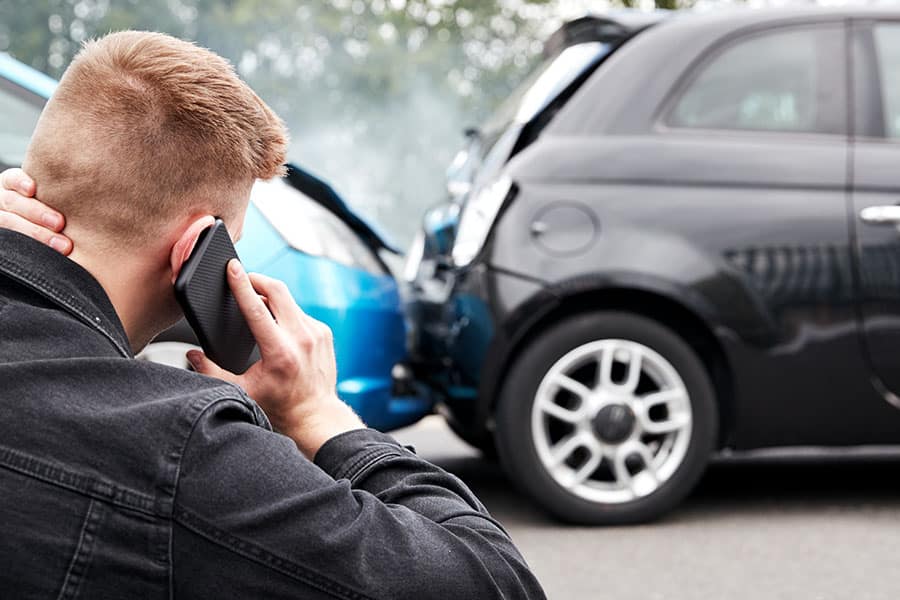So you’re driving down the road and suddenly hit a pothole and pop a tire, or perhaps, you are rear-ended at a stop light, or worse yet, you spill some coffee on your shirt and accidentally rear-end the car in front of you while trying to clean it up. In these scenarios, do you have to pay for the damage and repairs, or will your car insurance cover the costs?
Who pays all depends on the type of coverage that you carry. So, to find the answer, you must look to your individual insurance policy. You may choose coverage that pays for all of these scenarios, or you may only carry coverage that pays for the damage you cause to other vehicles. In many cases, it’s up to you and how much risk you are willing to take on yourself.
If you are wondering: how does car insurance work? And need help to make an informed choice on what coverage to carry, keep reading.
What is Car Insurance?
Car insurance serves as financial protection for drivers in case of a car accident. The simple way it works is that you, the driver, pay a monthly premium to an auto insurance company, and they provide payment for damage and injuries should an accident occur.
In actuality, though, it is much less straightforward depending on the type of accident that occurs, who is at fault, and whether you are paying for partial or full coverage.
Car insurance companies provide many different options for coverage, and you may choose to carry only a few or all of them. Let’s take a look at the different types.
Types of Coverage
Liability Coverage
This coverage pays for damage to others in accidents that are caused by you. The two types of liability insurance are bodily injury and property damage. Bodily injury liability covers expenses related to the injury or death of other persons such as drivers, passengers, and pedestrians. Property damage liability covers costs related to damage to another person’s property, such as their vehicle, a fence, or a mailbox.
In many states, liability is the only coverage required by the state to register a vehicle; this includes Arizona.
Collision Coverage
This coverage pays for damage to your vehicle if it is in an accident with another vehicle caused by you or if you collide with an object such as a fence or a pole. In some cases, it may also cover damage from potholes if the damage is severe. This coverage may also come into play if you are hit by an underinsured or uninsured driver.
Comprehensive Coverage
This coverage pays for damage to your vehicle caused outside of a car accident. Scenarios include hail damage, storm damage, falling objects such as tree limbs, rock damage to windshields, collision with an animal, and more. Comprehensive also covers break-ins, theft, and vandalism. If your car is stolen, comprehensive coverage reimburses you for the cost of your vehicle.
Underinsured/Uninsured Motorist Coverage
If you are in an accident that is not your fault, the at-fault driver’s liability insurance is supposed to pay for damage to your vehicle and medical expenses if injuries occur. But what if that driver doesn’t have insurance at all, or what if their coverage does not cover the damage caused? Do you have to pay out of your own pocket for medical payments or to repair your vehicle? Not if you have uninsured or underinsured motorist coverage.
If you carry this coverage, your insurance company will pay for the damage to your vehicle and medical expenses for you. They may still try to recover the costs from the at-fault party through legal action, but you will not have to wait for a court case to settle before you are taken care of.
Personal Injury Protection (PIP) Coverage
This coverage pays for medical expenses incurred in a car accident for you and your passengers, whether you are at fault or not. In some states, it may even cover costs such as lost wages if you have a lengthy hospital stay.
In the state of Arizona, PIP coverage is not available, but you may carry MedPay coverage, which is similar. Medpay covers medical payments but nothing additional such as lost wages.
Additional Coverage
Depending on how much you’d like to pay each month or how much risk you’re willing to incur, there are additional coverage options such as:
- Rental Reimbursement in case you need a rental car while yours is being repaired after an accident
- Roadside Assistance for when you have a flat tire on the side of the road, or you lock your keys in your car
- Rideshare Insurance if you are a driver for companies such as Uber or Lyft and need additional coverage for passengers or work coverage
- Gap Insurance in case your car is totaled in an accident, and you owe more for the vehicle than it is currently worth
In most cases, aside from normal wear and tear, if you can think of a scenario where you’d like coverage for your vehicle, there is insurance coverage that will cover it if you are willing to pay for it in a premium.
Is Car Insurance Required?
In most states, there is some type of coverage requirement. In the state of Arizona, to operate a motor vehicle, you must be able to show proof of two types of sufficient liability insurance:
- Bodily injury liability coverage: Minimum $25,000 per person and $50,000 per accident
- Property damage liability coverage: Minimum $15,000
Liability is the only required insurance you must carry, but it is always wise to research all of your options. And most of the time, drivers choose to carry above the minimum requirements so that they are not carrying all the risk with their own pocket.
Need Assistance Choosing the Right Coverage?
Are you unsure of how much coverage you should carry because you have an expensive vehicle or a large family to think about? Or perhaps you have an unfavorable driving record, and your insurance quotes are really high? Or perhaps you simply do not understand how to use car insurance. There are a million combinations of insurance you can choose from, and knowing how much coverage you need or don’t really need can be a tough choice if you’re doing it on your own.
The good news is, you don’t have to go it alone. At IIBA, we aren’t biased by selling you our own product. We search through over 40 available carriers to find you the best option for your specific circumstances. We can explain all the different coverages to you and give an honest opinion of what we think will work best for your family.
Call us today to let us help you keep your coverage high and your car insurance cost low.

